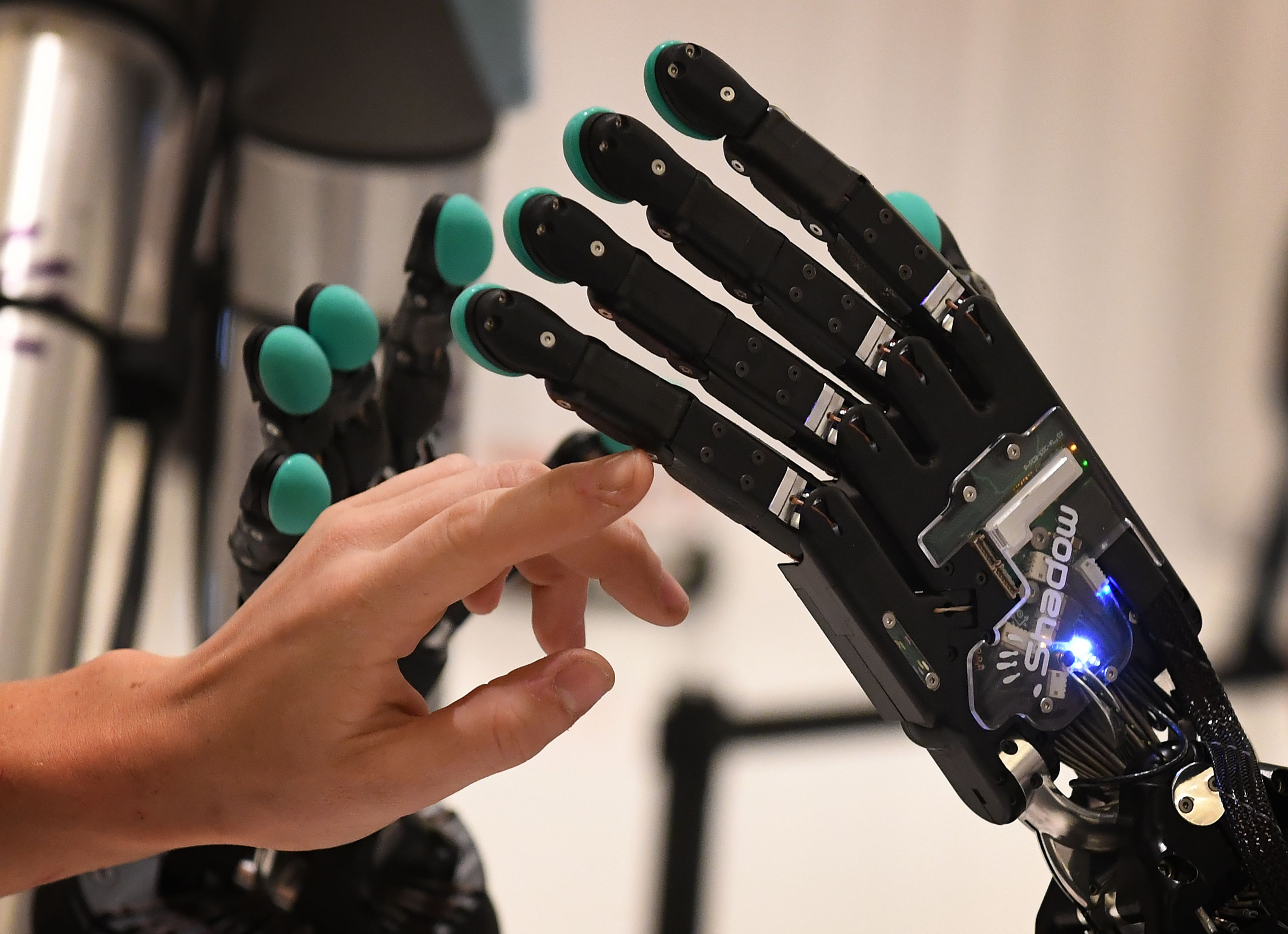Can AI Teach You How to Be a More Effective Human?

Someone touches a robotic hand during a conference on robotics and artificial intelligence in Las Vegas, Nevada. As technology advances, AI has an opportunity to not only impact business practices, but actual human traits and interactions.
Photo: Mark Ralston/AFP/Getty Images
We’ve long heard that AI is going to disrupt every facet of business, with a wide range of benefits touted, including increased efficiency, better customer service and lower overhead.
But too often, AI implementation misses its higher-end potential by being limited to the automation of simple tasks — the marketing department wants to analyze customer data faster, while the procurement office wants to optimize supply chain orders. Although addressing these tasks is beneficial, many companies have struggled to fully realize the potential of AI, which has caused an industry-wide disconnect about what AI can offer both individuals and businesses.
Compounding this confusion, AI has become a catch-all term, almost like “software” or “technology,” which leaves companies and society confused about what it means, its real intent and its real impact.
Time and again, we see examples where current forms of autonomous AI technologies — e.g., chatbots and process automation — are not quite capable of living up to their promise of matching human intelligence or delivering rapid ROI. Instead, we should consider how AI can be applied to impact more complex challenges in combination with a company’s most important asset — its people.
Using AI as a Coach
That’s why using AI as a coach to enhance human capabilities can have a profound impact on business.
As business leaders, we should explore how AI can help each individual employee enhance their strengths and reduce their weaknesses to elevate performance in correlation with a company’s desired business goals.
Here are three examples of how an AI coach can deliver real business value.
Improving Soft Skills
As machines become more prevalent in our daily lives, automating simple tasks, we increasingly crave human connections to help address complex problems and meet our emotional needs. As a result, there is a greater demand for soft skills and emotional intelligence, especially in the workplace.
According to the World Economic Forum’s Future of Jobs study, workers will need skill sets involving technological, social, emotional and higher-cognitive thinking to retain an edge. Ironically, AI’s true potential lies in its ability to help humans improve these skills that make us uniquely human. Whether AI is being used to enhance human physicality with robotics that work as prosthetics or if it’s elevating human intellect with real-time coaching to make us better at communicating, AI technology can help us become more advanced individuals.
AI coaches will undoubtedly be the future of enterprise and professional development.
Bolstering Human Capabilities
As technology advances, AI has an opportunity to not only impact business practices, but actual human traits and interactions. AI coaches, in particular, have the ability to guide humans in the moment to be better versions of themselves.
In fact, just this month, Microsoft announced Presenter Coach for PowerPoint, a new AI tool that gives feedback to someone practicing a presentation in front of their computer. According to reports, Microsoft’s AI coach gives individuals real-time feedback on their pacing during a practice presentation — for example, the coach tells someone when they’re using filler words or when they aren’t using inclusive language.
The software also stops presenters from just reading the slides: the ultimate presentation mistake! Whether it’s for business value or individual growth, the AI coach is able to bolster human skills at scale and in a way that was not previously possible.
Improving Customer Experience
Beyond presentation skills, AI coaches can help improve interactions between customers in large service organizations. Similar to Microsoft’s application, AI coaching techniques that analyze pitch, tone and other vocal cues to provide in-the-moment guidance can help call center agents be more empathetic and have better conversations with customers.
This is significant due to the strong correlation between customer service and business outcomes — in fact, reports suggest that $1.6 trillion is lost by American companies due to poor customer service, leading customers to switch to competitors. Further, 93% of customers are likely to make repeat purchases with companies that offer excellent customer service.
Increasing Employee Satisfaction
AI coaching does not just benefit customers. Employees who receive training in real time have improved performance, leading to a more satisfied and engaged workforce. Customer service can be emotionally draining, especially when conversations become difficult, but with the assistance of a coach, the emotional burden can be partially lifted off of employees.
This is big news for organizations, as the Department of Economics at the University of Warwick found that happy workers are 12% more productive than the average worker, and unhappy workers are 10% less productive.
And a report from IBM and Globoforce found that companies that scored the highest in creating a positive employee experience reported nearly three times the return on assets and doubled their return on sales. Using AI coaches to make top performers more consistent and lower performers better has direct benefits for employees, but it also has a ripple effect across the company, creating a profound positive impact on company culture.
The hype around AI is nearly deafening, but beyond the noise, there is an opportunity for humans to collaborate with technology like never before. AI coaches will undoubtedly be the future of enterprise and professional development.
With companies already using AI to coach presenters and call center agents, there is ample opportunity to expand into other markets — from conference calls to HR and salary negotiations, AI coaches can help us be more effective and consistent versions of ourselves.






